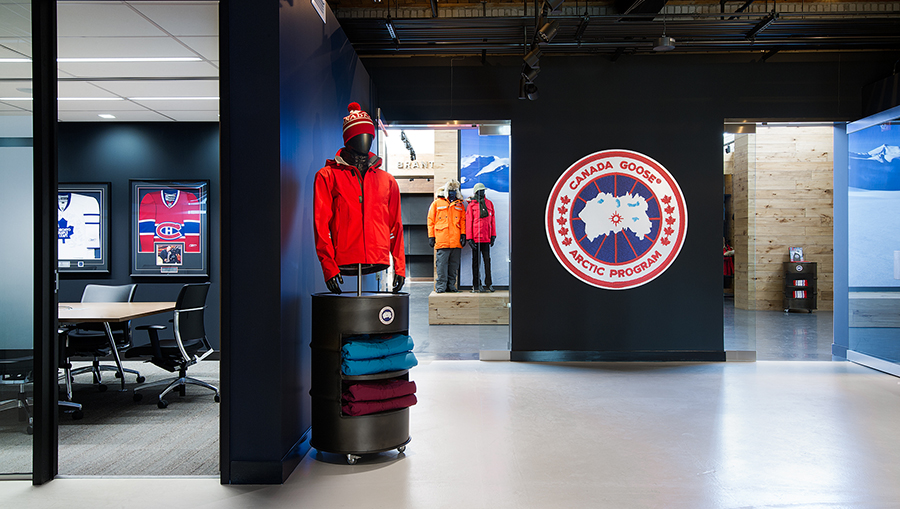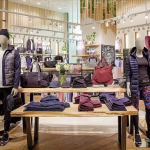Canada Goose cut its full-year forecast for sales and profit after reporting that the coronavirus is “having a material negative impact” on results.
The revised guidance comes as the company reported results for the third quarter that slightly topped analysts’ estimates.
“We delivered robust growth in the third quarter, notwithstanding geopolitical headwinds and an expected revenue timing shift in our wholesale business. Our direct-to-consumer (DTC) expansion continues to unlock and accelerate our development in major international markets,” said Dani Reiss, president and CEO. “From the frequent lines outside our stores to the response to new experiential innovations, consumer engagement was consistently strong across all geographies during peak season. While we recognize that we are now navigating a period of heightened uncertainty due to the coronavirus health crisis, we remain confident in our strategy and long-term potential.”
Third Quarter Fiscal 2020 Business Highlights (in Canadian dollars, compared to Third Quarter Fiscal 2019):
- Strong international growth led by a standout performance in Asia, where revenue doubled to $94.1m from $46.4m.
- Canada Goose was the top-performing brand by revenue on Tmall’s Luxury Pavilion during the Singles Day and Double 12 shopping festivals. E-commerce traffic and revenue grew significantly in Mainland China relative to last year.
- Over 8,000 consumers completed The Journey, an innovative new retail concept at CF Sherway Gardens in Toronto, during three weeks of holiday shopping from December 5 to December 26. The Journey combines a guided tour of digital content, interactive displays and the award-winning Cold Room, with a personalized inventory-free shopping experience featuring the full Canada Goose assortment online and same-day home delivery. The first of its kind, The Journey is a platform for brand storytelling, relationship building and retail evolution.
Third Quarter Fiscal 2020 Results (in Canadian dollars, compared to Third Quarter Fiscal 2019):
- Total revenue increased by 13.2 percent to $452.1m from $399.3m, or 13.7 percent on a constant-currency basis. The consensus revenue estimate had been C$448.18 million.
- DTC revenue increased to $301.8m from $235.3m, driven by incremental revenue from new retail stores. Retail revenue in Hong Kong was severely impacted by disruptions to tourism and retail traffic, together with frequent reductions to regular store operating hours and unplanned store closures.
- Wholesale revenue decreased to $150.3m from $164.0m. The decrease was driven by a higher proportion of total order shipments occurring in the first half of fiscal 2020 relative to last year.
- Gross profit was $298.4m, a gross margin of 66.0 percent. The 150bps increase in gross margin was driven by channel mix, with a higher proportion of DTC revenue.
- DTC gross profit was $226.7m, a gross margin of 75.1 percent. The 100bps decrease in gross margin reflects higher input costs and freight and duties from international sales, partially offset by pricing.
- Wholesale gross profit was $71.7m, a gross margin of 47.7 percent. Gross margin remained flat relative to last year, with the positive impact of pricing offset by higher input costs and product mix.
- Operating income was $161.4m. The increase of $21.5m in operating income was driven by revenue growth.
DTC operating income was $168.9m, an operating margin of 56.0 percent. Pre-store opening costs of $1.8m were incurred for locations not yet open. Excluding pre-store opening costs, DTC operating margin was 56.6 percent in fiscal 2020 compared to 58.8 percent in fiscal 2019. This reflects the decline in gross margin described above, and lower profitability for current year store openings. - Wholesale operating income was $56.5m, an operating margin of 37.6 percent. The 240bps decline in operating margin reflects the shift in wholesale revenue timing described above, coupled with an increase in headcount and other fixed costs.
- Unallocated corporate expenses were $61.4m, compared to $61.3m. This reflects an increased investment in marketing, offset by cost efficiencies and higher non-recurring costs in the prior year related to the Baffin acquisition and a secondary offering.
- Unallocated depreciation and amortization expenses were $2.6m, compared to $2.5m.
- Net income was $118.0m, or $1.07 per diluted share, compared to $103.4m, or $0.93 per diluted share.
- Adjusted EBIT(1) was $163.8m, compared to $144.7m.
- Adjusted net income(1) was $119.7m, or $1.08 per diluted share, compared to adjusted net income(1) of $107.2m, or $0.96 per diluted share. The consensus EPS estimate had been C$1.07.
Revised Fiscal 2020 Outlook
The coronavirus outbreak is having a material negative impact on performance in the current fiscal quarter ending March 29, 2020. As a result, the company has revised its outlook for fiscal 2020, which was last reiterated with the release of second-quarter fiscal 2020 results on November 13, 2019. The health crisis has resulted in a sharp decline in customer traffic and purchasing activity. Retail stores and e-commerce across Greater China have, and continue, to experience significant reductions in revenue. Due to global travel disruptions, retail stores in international shopping destinations in North America and Europe are also affected. No supply chain interruptions have occurred. The company believes that this is a temporary change in consumer behavior due to health precautions in extraordinary circumstances. However, the extent and duration of the disruptions remain uncertain and prolonged disruptions may also negatively impact future fiscal periods. Canada Goose’s brand and business momentum in Greater China remains strong, as reflected in the doubling of revenue in Asia in the fiscal third-quarter prior to the outbreak.
For fiscal 2020, the company currently expects:
- Annual revenue growth of 13.8 percent to 15.0 percent implying revenue of $945m to $955m, compared to at least 20 percent;
- Adjusted EBIT margin(1) contraction of 330 basis points to 280 basis points implying adjusted EBIT margin of 21.6 percent to 22.1 percent, compared to the expansion of at least 40 basis points; and
- Annual growth (decline) in adjusted net income per diluted share(1) of (2.2) percent to 0.7 percent implying adjusted net income per diluted share of $1.33 to $1.37, compared to at least 25 percent.
Key assumptions underlying the fiscal 2020 outlook above are as follows:
- Wholesale revenue growth of 9.0 percent to 11.0 percent on a percentage basis, compared to high-single-digits;
- Capital expenditures of approximately $75 million including investments in new retail stores, IT and manufacturing capacity, unchanged;
- Weighted average diluted shares outstanding of 110.9 million, compared to 112.4 million; and
- Effective annual tax rate approximately in-line with fiscal 2019, unchanged.
Photo courtesy Canada Goose














